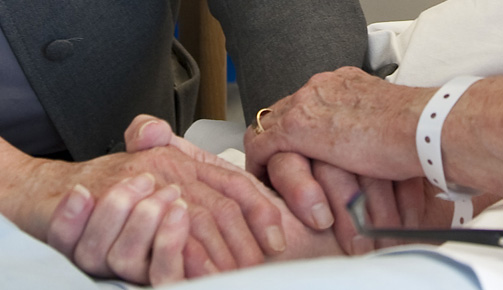
Saturday, April 16, is National Health Care Decisions Day.
Health care experts want people to use the day to consider difficult choices that will confront them and their families in a time of crisis.
Mark Clark is the CEO of the Pima Council on Aging, and co-chairman of the Elder Alliance in Tucson.
Clark said it’s hard to discuss these questions in the face of a stressful situation, for families and patients alike. Clark dealt with it himself, when his mother was near death last year.
“And frankly, she never put anything in writing," he said. "I can tell you in that last, crazy three weeks of her life, the last ten days in the hospital, it was very difficult for my sister, my brother and I to try and figure out who she wanted to be her representative, to help make decisions if she was unable to make those decisions.”
Clark said a number of factors can create anxiety for families unprepared to deal with end of life decisions.
“Certainly in those end of life times, they can magnify those family disturbances or disruptions that have existed maybe for years,” Clark said.
Troy Comstock, chief medical officer at OptumCare Arizona, said he believes putting together a plan is an important step, but convincing families to face an uncomfortable reality is hard to do.
“In order to get started, I think it’s important first of all, to acknowledge the conversation needs to happen for the good of yourself and for your loved ones,” Comstock said.
The American Psychological Association suggests focusing on the values and beliefs of the person nearing the end of life. It cites two primary principles: individual autonomy and informed consent.
“Above all, the conversation and the planning needs to center around the goals of the individual for whom it matters most," Comstock said.
"If they don’t understand those goals, and if they can’t make those decisions, with the best information that they have, then I don’t think it will be a productive time spent.”
Experts say an important part of the decision making process is a practical one. They suggest families formalize their agreements on end-of-life choices by putting them in writing.
“It’s important to have it in writing," said Clark. "Because if it’s not in writing, then the health care system won’t necessarily follow your wishes and desires.”
“The loved one can have one conversation at one time with their brother and sister," Comstock said. "Then, they have a separate conversation at another time with another loved one, and people are hearing different things, and so when they come together to make that decision, based on those conversations, it can become very confusing.”
Counselors remind families that time and planning combine to fulfill hopes and dreams at every stage of life. They say sensitive conversations, discussing the future and making a plan, can also help fulfill the hopes of those facing the end of life.
Learn More
Arizona Public Media is joining the Pima Council on Aging and the End of Life Care Coalition for an upcoming series of workshops about end of life care planning. The workshops are free but reservations are required.
Pima Council on Aging has more information on the workshops.

By submitting your comments, you hereby give AZPM the right to post your comments and potentially use them in any other form of media operated by this institution.